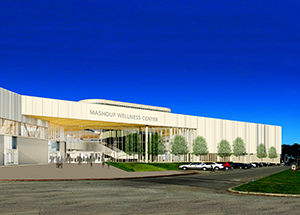University to showcase commitment to sustainability
Drought-tolerant plants and gardens. A solar-powered rainwater harvesting system. Electric vehicle charging stations and bicycle repair kiosks. A requirement that all students take at least one course focused on sustainability.
 A commitment to the environment is nothing new for San Francisco State University. In fact, it's included in the University's strategic plan, which promises that SF State will "empower students with an education that instills the value of sustainability" and "model environmental sustainability on our campus that is exportable to our communities beyond the campus."
A commitment to the environment is nothing new for San Francisco State University. In fact, it's included in the University's strategic plan, which promises that SF State will "empower students with an education that instills the value of sustainability" and "model environmental sustainability on our campus that is exportable to our communities beyond the campus."
SF State will showcase its sustainability efforts, and welcome more than 1,000 representatives from other colleges and universities who will present their campus' work, when it hosts the 14th annual California Higher Education Sustainability Conference from July 20 to 24.
"Across the United States, colleges and universities are playing an important role in the effort to create a more sustainable future," said Director of Sustainability and Energy Caitlin Steele. "At SF State, sustainability is a value that we are putting into practice in all parts of campus, from the classroom to the residence halls to our grounds."
During the conference, SF State representatives will discuss the University's various projects and initiatives to promote sustainable living. They include:
- Bicycle tours of the campus and of San Francisco, the latter stemming from a course begun in 2014 focused on the theories and practices of sustainable transportation. The course was created through funding from a California State University Campus as a Living Lab grant.
- Implementing sustainability measures in recreational buildings, including the Mashouf Wellness Center, which is expected to be LEED Platinum building when completed in 2017
- The inclusion of sustainability and resilience as a major component of the University's new strategic plan
Other University initiatives focused on sustainability include:
- Installing a new, high-tech irrigation system that is expected to dramatically reduce campus water usage
- Replacing lawns with native grasses and other drought-tolerant plants
- Bachelor's and master's degrees in environmental studies and an MBA with an emphasis in sustainable business
- A Climate Action Plan that aims to reduce SF State's greenhouse gas emissions to 40 percent below 1990 levels by 2030 and increase renewable energy procurement to 30 percent (from the current 20 percent)

The Mashouf Wellness Center is expected to be LEED Platinum when completed in 2017.
Approximately 80 percent of the SF State population commutes via sustainable transportation such as public transit or walking. Recycling and compost bins are found in all corners of campus. And the University has been recognized by The Princeton Review as one of the nation's "greenest."
"While there is much that remains to be done, we are proud of what we have accomplished to help make SF State a model sustainable university," Steele said. "We look forward to sharing our work with our colleagues from across the state, as well as learning new ways to keep our campus at the forefront of this critical issue."
The theme of the 2015 California Higher Education Sustainability Conference is "Can We Change Fast Enough?" For more information about the conference, visit http://cahigheredusustainability.org. Conference participants are encouraged to share their posts on social media using the hashtag #CHESC2015.
To learn more about SF State's sustainability initiatives, visit http://sustain.sfsu.edu.